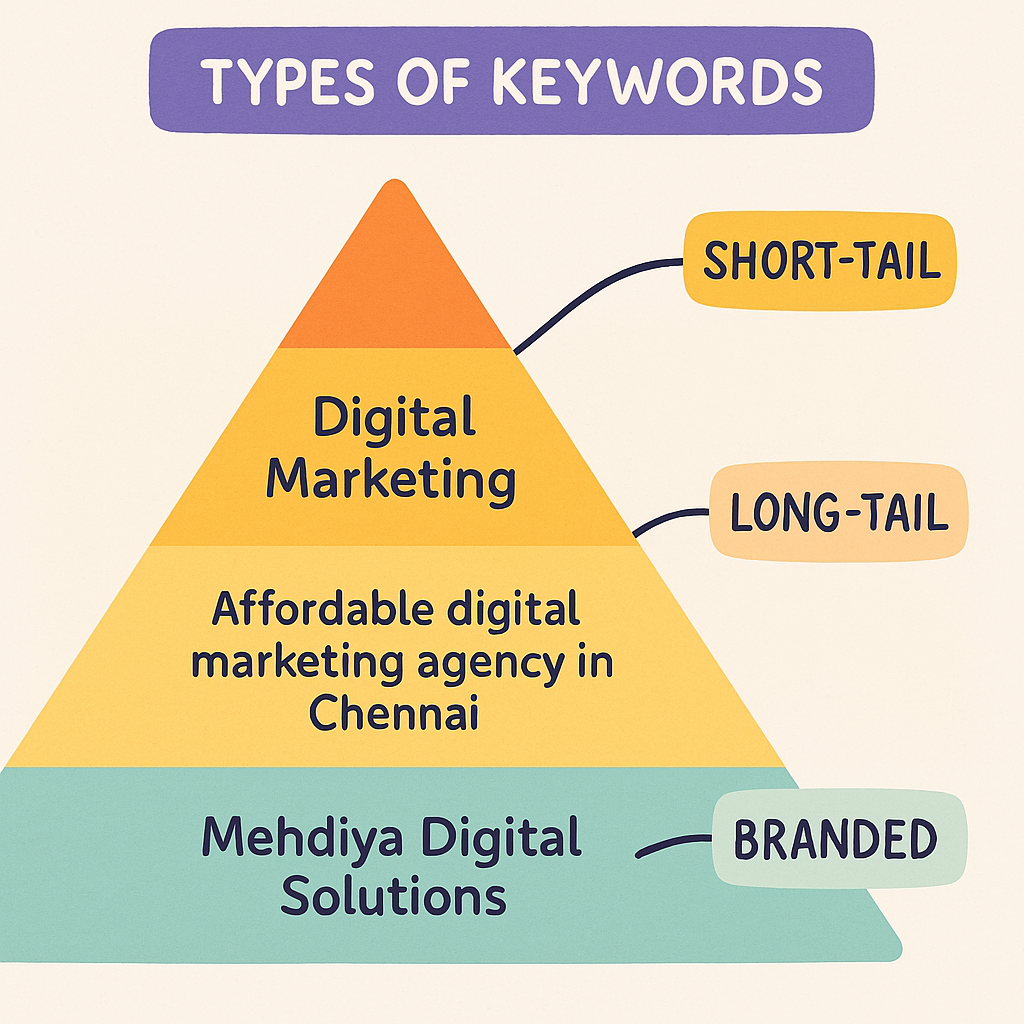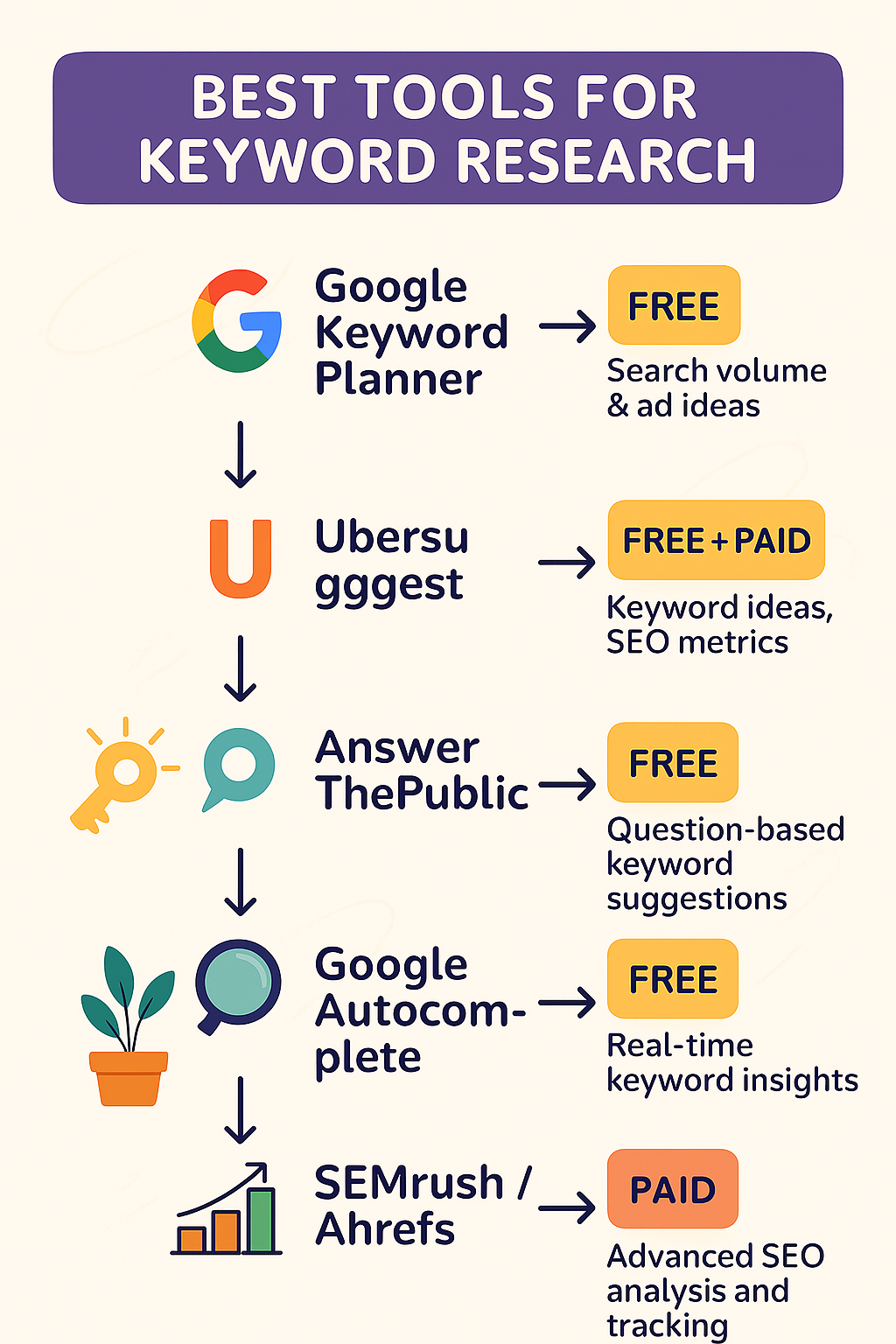Keyword Research in Digital Marketing: The Beginner's Power Tool for Google Rankings
🗓️Published: july 2025, 🕑 6 min. read
“Content is fire, and keyword research is the match.” – Neil Patel

Imagine opening a cake shop on a busy street. Your desserts are amazing — but no one walks in unless they notice you. Keyword research is how you make your website show up when someone is craving exactly what you offer.
Also, if you’re writing content, running ads, or trying to grow your business online — but you’re not doing keyword research — you’re leaving traffic, leads, and money on the table.
In this guide, we’ll walk you through everything you need to know about keyword research in digital marketing — from definitions and types to tools, techniques, and best practices. Whether you’re a freelancer, blogger, or business owner, this blog will help you understand how to implement keyword research effectively to increase your visibility and results.
Table of Contents
- What is Keyword Research in Digital Marketing?
- Why Keyword Research is Important
- Types of Keywords (with Examples)
- How to Do Keyword Research (Step-by-Step Guide)
- Best Free & Paid Tools for Keyword Research
- Tips to Use Keywords the Right Way
- FAQs
- Final Thoughts
What is Keyword Research in Digital Marketing?

Keyword research is the backbone of search engine optimization (SEO). It refers to the process of identifying the specific words and phrases people use in search engines when they want to find something online. In digital marketing, keyword research helps creators and marketers develop content that aligns with real user intent. It ensures that your content doesn’t just exist—it’s actually found by the right audience.
Keyword research is also used in pay-per-click (PPC) advertising, content marketing, video optimization, and even on social media platforms where discovery plays a key role. The process involves finding high-volume, low-competition keywords that are relevant to your niche and audience.
This not only boosts your ranking on Google but also ensures that your traffic is qualified—meaning users are more likely to take action (read, subscribe, buy, etc.) when they land on your content.
Why Keyword Research is Important
The importance of keyword research in digital marketing cannot be overstated. Without it, you’re essentially guessing what your audience wants. When you know exactly what your potential customers are searching for, you can tailor your content to answer their questions, solve their problems, and meet their needs.
Here are a few reasons why keyword research is critical:
– It improves your SEO performance by aligning your content with search intent.
– It increases visibility and organic traffic from search engines.
– It helps you stay ahead of competitors by targeting untapped or trending topics.
– It provides valuable data for paid ad targeting and content strategy.
Good keyword research leads to better user experience because it results in relevant, high-quality content that delivers value. It also makes your marketing efforts more measurable and efficient.
Types of Keywords (with Examples)

Different types of keywords serve different purposes in a user’s search journey. Understanding these types will help you build a complete keyword strategy:
1. Short-Tail Keywords:
– 1–2 words, e.g., ‘marketing’, ‘skincare’.
– High volume, but low intent and high competition.
– Best used for brand awareness, category pages, and homepage SEO.
2. Long-Tail Keywords:
– 3+ words, more specific, e.g., ‘digital marketing tips for doctors’.
– Lower volume but higher intent and conversion rates.
– Ideal for blog posts, tutorials, and niche landing pages.
3. Transactional Keywords:
– Indicate intent to buy, like ‘order brownies online Chennai’.
– Use these on sales pages, Google Ads, and product descriptions.
4. Informational Keywords:
– Used for learning, e.g., ‘how to grow on Instagram’.
– Perfect for blogs, YouTube videos, and guides.
5. Navigational Keywords:
– Brand-specific searches like ‘HubSpot login’.
– Use them to ensure visibility for your business name.
6. Geo-Targeted Keywords:
– Combine services with locations, e.g., ‘digital marketing agency in Mumbai’.
– Essential for local SEO, Google Maps optimization, and small business outreach.
How to Do Keyword Research (Step-by-Step Guide)
Here’s a beginner-friendly guide to conducting keyword research for your blog, business, or digital project:
1. Define Your Goal – What’s the purpose of the content? Inform, convert, entertain, or educate?
2. Brainstorm Seed Keywords – These are broad keywords related to your niche, such as ‘home baker’, ‘freelance SEO’, ‘natural skincare’.
3. Use Keyword Tools – Platforms like Google Keyword Planner, Ubersuggest, and AnswerThePublic will give you ideas, search volume, and competition levels.
4. Analyze Metrics– Focus on search volume, SEO difficulty, CPC, and relevancy. Avoid chasing only high-volume keywords if they’re too competitive.
5. Group Keywords by Intent – Organize keywords into categories: informational, transactional, and navigational.
6. Refine & Finalize – Choose 1 focus keyword and 3–5 long-tail variations per blog/page to target both broad and niche queries.
Best Free & Paid Tools for Keyword Research
Google Keyword Planner (Free): Great for search volume and ad ideas.
– Ubersuggest (Freemium): Shows traffic estimates, keyword difficulty, content ideas.
– AnswerThePublic (Free): Helps discover question-based keywords and content gaps.
– SEMrush / Ahrefs(Paid): Premium tools for competitor analysis, SERP tracking, and keyword grouping.
– Google Autocomplete (Free): Gives real-time insights as you type into the search bar.

Tips to Use Keywords the Right Way
Here’s how to implement keywords effectively without harming readability or SEO:
– Place your main keyword in the title, meta description, first 100 words, and one H2 heading.
– Sprinkle supporting keywords throughout the article naturally.
– Use LSI (Latent Semantic Indexing) keywords to provide depth and relevancy.
– Use keywords in image file names and alt text.
– Avoid keyword stuffing. Focus on delivering value and maintaining a natural flow.
The optimal keyword density is 1.5% to 2.5%. For a 2000-word blog, that’s around 30–50 keyword mentions.
FAQs
Q1: What is an example of keyword research?
Imagine you’re a home baker in Chennai. You use Google Keyword Planner to search for what people type when looking for baked goods. You find keywords like ‘eggless brownies near me’ and ‘custom cakes Chennai’. These keywords guide you in writing blog posts and product descriptions that help customers find you.
Q2: How do you identify a keyword?
Start by thinking from your customer’s point of view. What would they search for to find your service? Use tools like Google Autosuggest, Ubersuggest, and AnswerThePublic to see real search queries. Validate them with metrics like volume and competition.
Q3: Importance of keyword research in digital marketing
Keyword research is vital for digital marketing because it brings alignment between what you offer and what users are searching for. It improves your content strategy, SEO, PPC performance, and ROI. Without keyword research, you’re likely creating content blindly without measurable impact.
Q4: What are keywords in SEO?
In SEO, keywords are the core terms that tell search engines what your page is about. They’re the queries users type in. Strategically placing relevant keywords helps your content rank higher and ensures you’re targeting the right audience.
Final Thoughts
Keyword research is not a one-time task — it’s an ongoing strategy that evolves with trends and audience behavior. The better your keyword research, the better your chances of reaching people who are actually looking for what you offer.
So before you write or publish anything online, always ask:
‘What would someone type into Google to find this?’
Answer that — and you’ve just found your keyword.
